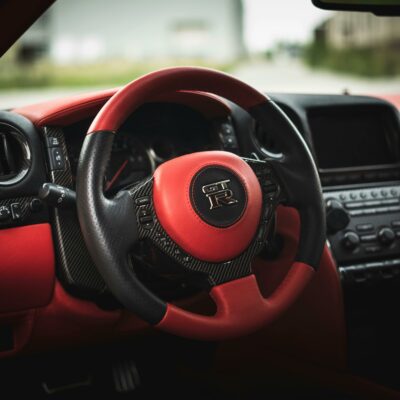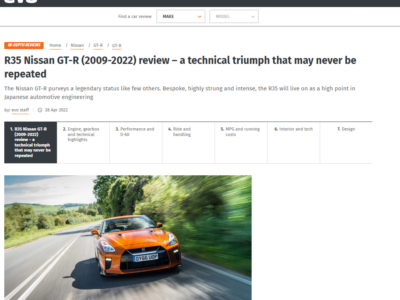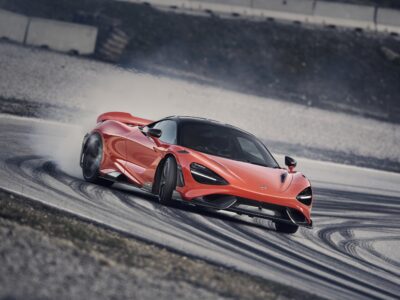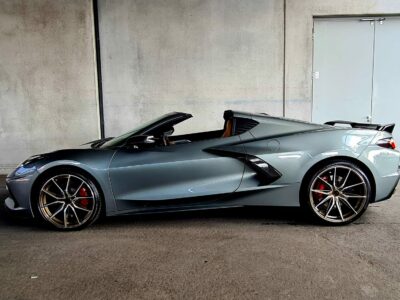NISSAN GTR | PRICE, REVIEW AND DRIVING REPORT
All about Nissan GTR
The Nissan GTR is one of the most prominent sports cars launched by Nissan, and it offers a unique and large set of features that make it the ideal choice for those looking for speed and fun while driving. The car is distinguished by unprecedented features in terms of interior and exterior designs that give its driver an exceptional experience. In addition to the power of the engines and high propulsion, the actual assembly of the engine is equally important as the engineering, and this process was done manually by a single craftsman, whose signature you will find on a small prominent plate on the engine.



The model history of Nissan GTR series
It began when the Japanese Prince Motor Company started producing a car called “Skyline” between 1957 and 1966. It was equipped with a 1.5-liter engine, but in 1964, the first GT-R dedicated to racing was introduced. Prince Motor Company stopped producing the car after merging with Nissan, and the latter company changed its name to “Nissan Skyline”. After this merger, Nissan worked on developing the vehicle to become over time one of the best in the world of engines. Let us now learn about the information of generations about the Nissan GT-R in brief.
Series 1 – Nissan Skyline GTR PGC10
The history of the Nissan GT-R began when the first-generation Skyline GT-R R. PGC-10 was announced at the 1969 Tokyo Motor Show in Japan. This new car was equipped with a five-speed manual transmission and a two-liter inline six-cylinder engine with 160 horsepower.
Series 2 – Nissan Skyline GTR C110
In 1973, Nissan announced the second-generation GT-R with the unveiling of the Skyline GT-R C110 equipped with a five-speed manual transmission. This rear-wheel drive car was powered by a 2.0-liter inline-six engine with 160 horsepower.
Series 3 – Nissan Skyline GTR R32
The third-generation Nissan Skyline GT-R R32 was a breakthrough in the world of engines. It was equipped with a multi-link front and rear suspension, electronically controlled four-wheel drive, and a five-speed manual transmission. In addition, the car was available with a 2.6-liter twin-turbocharged engine with 280 horsepower.
Series 4 – Nissan Skyline GTR R33
The R33 GT-R had a newer all-wheel drive system called the Atesa ATS Pro with a limited-slip differential, making it more capable than its predecessor. The engine remained the same. However, it somehow performed better. The R33 GT-R was the first production car in the world to lap the Nürburgring in under 8 minutes!
Series 5 – Nissan Skyline GTR R34
Nissan claimed it produced around 276 horsepower, but factory output is widely believed to have been slightly higher than 400 horsepower. The Z-Tune featured a 2.8-liter straight-six engine that produced 493 horsepower. Aftermarket modification options were plentiful, with many models producing over 1,000 horsepower. This generation was nicknamed the “Return of Godzilla” because it was as revolutionary as the R33.
Series 6 – Nissan Skyline GTR R35
This generation of the R35 GT-R was equipped with a 473-horsepower twin-turbo V6 engine, allowing it to outperform American, Italian, and German speedsters. Not only was the car reliable, but it was also advanced in all-wheel drive with strong handling, with sleek, powerful, and modern exterior designs.



What makes the Nissan GTR so special?
The Nissan GT-R represents the pinnacle of Nissan’s engineering prowess, featuring several advanced technologies and performance enhancements not typically found in production vehicles:
Advanced aerodynamics:
The GT-R uses an advanced aerodynamic package that significantly enhances stability and downforce. It generates up to 100kg of downforce at 300km/h, for exceptional stability and high-speed cornering.
Innovative drag reduction system:
The GT-R features the Integrated Drag Reduction System, a technology borrowed from motorsports. This system adjusts the angle of the rear wing to improve aerodynamic efficiency, reduce drag on straightaways, and enhance braking stability. It can reduce braking distances by up to 5m from 250km/h.
Lightweight body:
The GTR tries to maximize performance, and Nissan makes extensive use of lightweight materials throughout the GT-R. Components such as the carbon fiber roof, hood, and rear wing help reduce weight, enhancing agility and responsiveness.
Powerful engine:
The GT-R is powered by a hand-built 3.8-liter twin-turbo V6 engine that produces an impressive 600 horsepower and 652 Nm of torque. This engine is capable of propelling the car from 0 to 100 km/h in just 2.5 seconds, with incredible acceleration produced by its power.
Track-specific components:
Designed for extreme performance enthusiasts, the GT-R offers an optional Track Edition, which features upgraded suspension components, carbon ceramic brakes and lightweight alloy wheels. These improvements contribute to improved handling and braking performance on both road and track.
Technical data of the Nissan GTR
Drive of the GTR
- Engine: 6-cylinder twin-turbocharged V6
- Fuel Type: Premium unleaded gasoline
- Displacement: 3799 cc
- Compression Ratio: 9.0:1
- Engine Power: 441 kW / 600 hp at 6800 rpm
- Torque: 652 Nm at 3600 rpm
- Drive Type: All-wheel drive (AWD)
- Transmission: 6-speed dual-clutch transmission
- Emission Standard: EURO 6d
Body of the GTR
- Vehicle Type: Coupe
- Seats: 2 people
- Dimensions: Length 4710 mm x Width 1895 mm x Height 1370 mm
- Wheelbase: 2780 mm
- Track Width: 1550 mm front / 1550 mm rear
- Ground Clearance: 120 mm
- Boot Capacity: 295 liters
- Curb Weight: 1760 kg
- Weight Distribution: Approximately 54% front / 46% rear
- Permissible Total Weight: 2100 kg
- Payload: 340 kg
- Chassis: Independent suspension with coil springs and shock absorbers
- Steering Ratio: 14.0:1
- Rim Size: 20″ x 10.5J front / 20″ x 11.5J rear
- Tyres: Bridgestone Potenza RE-71R
- Tyre Size: 275/35-R20 front / 315/30-R20 rear
Performance
- Top Speed: 315 km/h
- Acceleration 0 to 100 km/h: 2.8 seconds
- Acceleration 0 to 200 km/h: 8.9 seconds
- Braking Distance 100 to 0 km/h: 33 meters
- Braking Distance 200 to 0 km/h: 120 meters
Reviews of the Nissan GTR
Top automotive magazines around the world have extensively reviewed this masterpiece, offering in-depth analyses of its exceptional performance. You can explore these expert reviews to gain a deeper understanding of its remarkable capabilities.
CAR AND DRIVER
After 15 years of terrifying the competition on track and street, Godzilla is finally being put to rest. Nissan says 2024 will be the last year of production for the R-35 generation GT-R in the States, although it’s been issued a stay-of-executing in Japan until the end of the 2025 model year.

EVO
Back in 2007 when the R35 Nissan GT-R first debuted in Japan, its facts and figures looked like something from a dreamscape. It’s hardware tally was shocking (bespoke twin-turbocharged V6 engine, transaxle dual-clutch transmission, an active all-wheel-drive system that required two prop shafts and active differentials on both axles for total torque vectoring).

Top Gear
This was the first GT-R not to carry the Skyline name, but it made up for a slight chink in its heritage with something we can all get on board with. Power. At launch, its 3.8-litre twin-turbo V6 – not so poetically named VR38DETT – produced 473bhp and 434lb ft, figures that almost seem tame nowadays.

Competitors of the Nissan GTR
You might think that despite all the advance praise, the GTR is in a league of its own – but of course that’s not entirely true. Among the established sports car manufacturers, there are some competitors who are happy to take on the Nissan GTR:
McLaren 765LT

The McLaren 765LT is the super-sporty version of the already extremely high-performance McLaren 720S and, like the 992 GT3 RS, also has a number of details directly from motorsport.
Ferrari 488 Pista

The Ferrari 488 Pista is not a completely new model from the Italian manufacturer, but it is the last motorsport variant of Ferrari’s mid-engined 488 GTB series to date – there is no such model from the Ferrari F8 Tributo.
Corvette C8

The latest Corvette series with the abbreviation C8 Stingray also has a particularly potent variant with all kinds of motorsport extras up its sleeve and goes by the name Corvette C8 Z06.
How can you drive the Nissan GTR?
We can’t help all of you who haven’t had your mouth watering yet with all the highlights of the GTR….
For everyone else, however, we would like to show you how you can still drive the Nissan GTR yourself today:
Option 1: Buy a Nissan GTR
The most straightforward way is to visit a Nissan dealership. You can use the Nissan dealer locator on their official website to find a dealership near you. Dealers can offer new GT-Rs and might also have certified pre-owned options.
Besides, You can find GT-Rs listed by private sellers on classified ad sites or forums dedicated to high-performance cars. Be sure to have a trusted mechanic inspect any used vehicle before purchasing.

Option 2: Nissan GTR test drive
Occasionally, Nissan organizes special events where potential customers can test drive their high-performance models. Keep an eye out for Nissan announcements or promotions.
Sometimes, Nissan and other manufacturers showcase their cars at car shows or exhibitions. This can be a good opportunity to see and sometimes test drive a Nissan GTR.

Option 3: Rent a Nissan GTR at DRIVAR®
If you don’t want to buy the Nissan GTR right away or have the right connections for a test drive at the Nissan Centre, you can still rent a Nissan from DRIVAR today – regardless of whether it’s actually a GTR for rent or one of the numerous other models.

FAQ
How much does the Nissan GTR cost?
The Nissan GTR starts at 120,000$, it can be varied based on the features of the car.
Target group: Who is the Nissan GTR for?
Clearly, the GTR is definitely not a car for everyone – and it doesn’t want to be and shouldn’t be. On the other hand, fans of the GTR series know very well what they love so much about these vehicles. But for whom is Nissan’s motorsport spearhead suitable at all?
The Nissan GTR is the right car for anyone who…
- place more emphasis on real performance than simple elegance
- looking for a real racing car with legal road approval
- prefer to be at home on a real race track rather than on the road
- have a firm character and are sometimes conspicuous on the road
- think a normal GTR is far too boring
- still driving a car for the fun of driving in 2023
